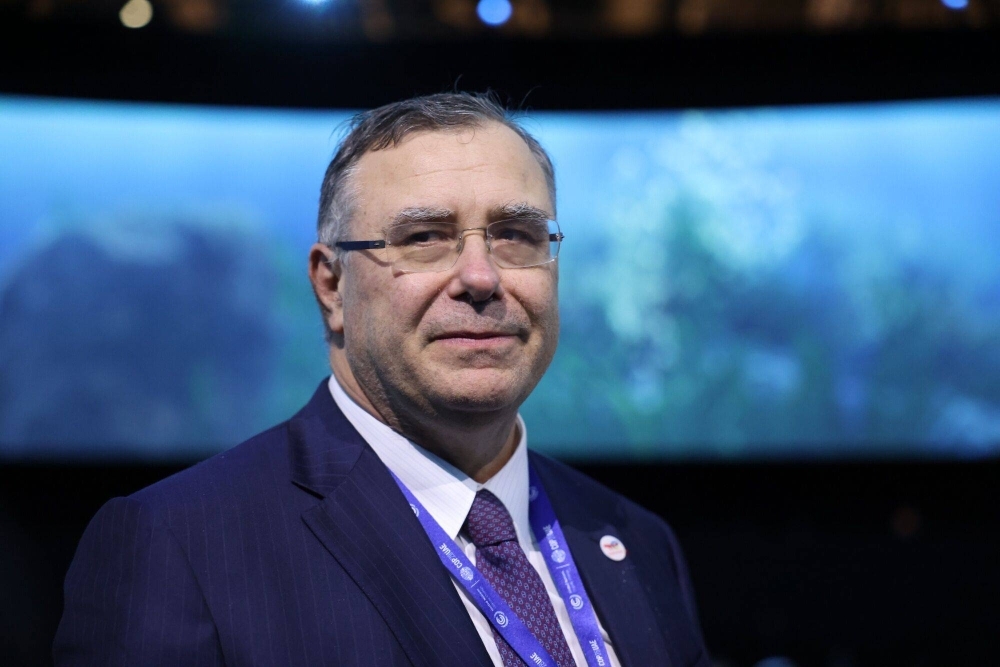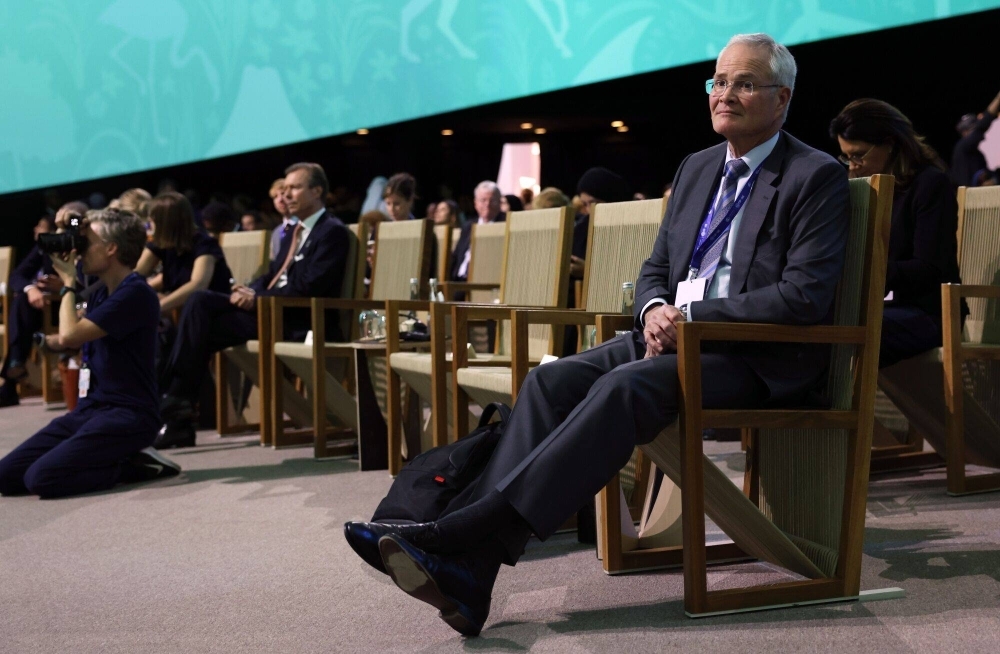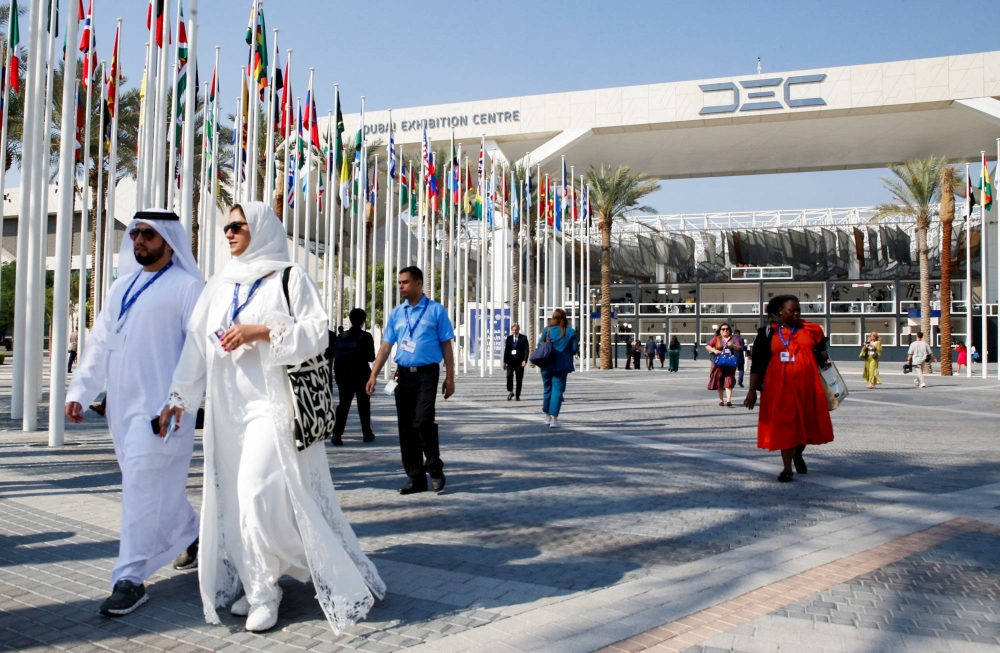At the world’s most important climate summit, the Organization of the Petroleum Exporting Countries — whose members supply almost 30% of the world’s oil — has a pavilion for the first time.
There, staff were giving out a children’s book about oil. A grey-haired cartoon professor named Riggs takes young readers through topics as arcane as the lightness and sourness of crude, before explaining why oil is important: “Without oil, we would not be able to continue to enjoy the same standard of living.” The book proved so popular that the pavilion ran out of copies just four days into the two weeks of COP28.
Oil and gas executives have tended to keep a low profile at the annual U.N. climate change gathering, but they have little reason to hide at COP28, hosted by the United Arab Emirates — one of the world’s largest oil exporters — and led by the CEO of its national oil company. At least 2,456 representatives of the fossil fuel industry have been granted access to COP28, according to an analysis by the Kick Big Polluters Out activist group. The number is nearly four times higher than in Sharm El Sheikh, Egypt, last year. If they were a country, they would outnumber all national delegations at the conference except for Brazil and the UAE.
Heads of major oil companies have attended as part of country delegations. The CEO of TotalEnergies, Patrick Pouyanne, is part of the French delegation, while Darren Woods, CEO of Exxon Mobil, is accredited to the UAE’s. Other industry representatives attend under the umbrella of influence groups such as the International Emissions Trading Association (IETA), which registered at least 110 people for the summit.
As COP28 enters its final few days, the most contentious issue is whether the final agreement will pledge to phase down fossil fuels. To many of the thousands of climate activists among the 100,000 or so people registered to attend, the prominence of the oil and gas industry is a travesty — giving the industry most responsible for climate change a seat at the table.
Oil exporters are pushing back. Saudi Energy Minister Abdulaziz bin Salman said this week that the text shouldn’t agree to a phase down, while OPEC’s secretary-general wrote to members asking them to resist the idea.
“You don’t invite the tobacco lobbyists to a health convention when you’re writing health policy,” said Emily Lowan of Climate Action Network Canada. “They have clear stated interests against the very premise of these negotiations, at this COP in particular, related to agreeing on the language on the phase out of fossil fuels.”

Patrick Pouyanne, chief executive officer of TotalEnergies SE, during a COP28 meeting on Dec. 2.
| Bloomberg
Others take industry’s statements of good intent at face value and argue the coalition tackling the climate crisis needs to be as broad as possible. Either way, there’s no way of avoiding oil and gas at the giant expo park hosting COP28 on the outskirts of Dubai.
From luncheons to panel discussions in country pavilion panels and high level declarations, oil and gas is making its case. Industry-linked events often focus on technologies such as carbon capture and making fossil fuel extraction “greener.”
At IETA’s two-story “BusinessHub,” where there’s a Carbon Market Networking Lounge, a Partners Private Lounge, fruit bowls and an espresso machine, carbon capture was at the center of discussions. The group’s 110 registered attendees represent companies ranging from Norway’s Equinor to Shell. The sign welcoming visitors lists Chevron, America’s No. 2 oil company, as a partner.
Back-to-back events on carbon capture and storage coincided with a networking luncheon for a coalition of Canadian industry leaders. Avik Dey, CEO of Capital Power, a utility with gas- and coal-fired power plants, is attending COP with the U.S.-based Business Council for Sustainable Energy, an association whose members include the American Gas Association.
“I’m super excited to be here because the heavy-emitting industries are here and being part of the conversation,” said Dey, whose badge lists him as an observer. “I think mankind is the problem. We’re all part of the problem, so all of us need to be part of the solution.”
For industry representatives, COP presents a chance to be in the same room with potential partners and government officials with whom it might take weeks to get a meeting back home. Ministers, CEOs and corporate strategists sip coffee in the same pavilions and cram together in the same panel audiences, where it’s easy to strike up an informal chat.

COP28 President Sultan Ahmed Al Jaber holds a news conference in Dubai on Friday
| Reuters
By keeping Sultan Al Jaber as both head of Abu Dhabi National Oil and president of the climate summit, the United Arab Emirates had given industry a green light, said Richard Merzian, a director at an Australian renewables industry association and former COP negotiator for Australia.
“What I see now is a proliferation of these spaces to create more legitimacy for these delay tactics,” Merzian said. “Carbon capture and storage is a technology invented by the oil industry in order to push C02 down and push oil up.”
But Al Jaber, who’s always made plain his belief that his industry should be part of the situation, put oil and gas at the heart of one of the signature achievements at COP28. He persuaded more than 40 oil and gas companies, including Exxon, Total and Shell, to join an Oil and Gas Decarbonization Charter. It’s controversial because it doesn’t commit members to reductions in oil and gas production, but they will have to all-but-stop emissions of methane, a super-harmful greenhouse gas, by 2030. That could have a tangible impact on global emissions.
“We must do all we can to decarbonize the energy system we have today,” Al Jaber told delegates last week.
And he has plenty of supporters as well as detractors.
The “UAE brought the energy sector into the room to have, for the first time, inclusive real dialogue about the transition, supply-demand dynamics, about what is really difficult and what is relatively easier in terms of wins, like the methane pledge,” said Jay Collins, vice chairman of corporate and investment banking at Citi.
But at times, the irony seems almost too much. At one event, the CEO of Libya’s National Oil launched a new sustainability plan, complete with glossy brochures promising the reduction of gas flaring by 2030. In an interview after the event, the CEO said the company was seeking to increase production by 100,000 barrels a day by the end of next year and was pursuing a plan to get daily production to 2 million barrels by 2026.

Darren Woods, CEO of Exxon Mobil, listens during a meeting at COP28 in Dubai on Dec. 2.
| Bloomberg
The industry’s boldness has also caused tension with renewables groups and climate activists.
In one part of the Blue Zone, the Beyond Oil and Gas Alliance, a coalition pushing renewable energy, shares a makeshift wall with the Clean Resource Innovation Network (CRIN), a group that “unites Canada’s oil and gas industry, innovators, technology vendors, academia, research institutes, financiers and government,” according to its LinkedIn page.
At yet another carbon capture panel in the CRIN pavilion called “Capturing Your Attention: Sharing Carbon Capture & Storage Knowledge,” panelists Dey from Capital Power and Kendall Dilling, a soft-spoken oil executive who also chairs Canadian oil sands companies group Pathways Alliance, faced critical questioning from an audience where “emissions cap” baseball hats featured prominently. Above the panelists, a television screen showed an image of snow-capped mountains and a still blue lake, overlaid with “CRIN” in fine lettering.
Attendees said that Pathways had been lobbying to introduce loopholes and a delayed timeline to the Canadian emissions cap plan. Halfway through the panel, a group of activists stood up and walked out of the CRIN pavilion, holding signs that read “No to Carbon Capture. Stop Big Oil Greenwashing.” There were enough audience members who stayed, many of them part of the Canadian energy industry, to fill the empty seats.

